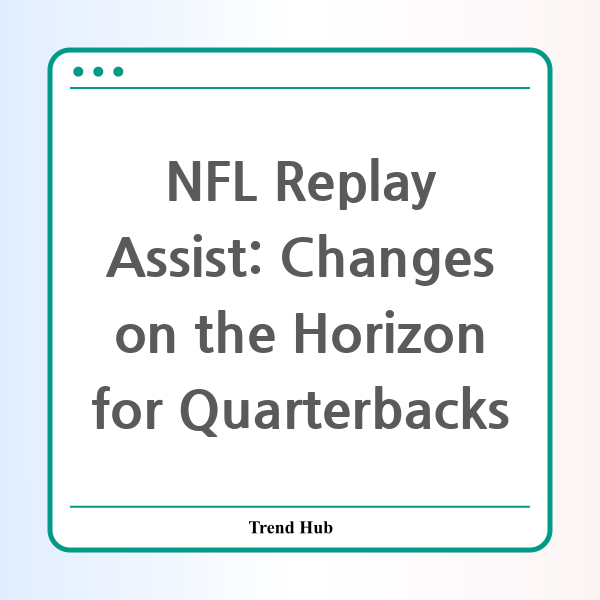* This website participates in the Amazon Affiliate Program and earns from qualifying purchases.

As NFL fans gear up for another exciting season, discussions around the officiating rules continue to heat up. The latest talks revolve around the controversial use of replay assist, particularly concerning quarterback slides. Will this technology help create a more balanced playing field? Let's dive into the expanding world of NFL replay assist and its implications for the future of the game.
Recently, the NFL has signaled that they may expand their replay assist system, a method introduced in 2021 to enhance the accuracy of game calls. With the potential addition of quarterback slides to this system, there is a possibility for greater clarity and fairness in officiating—something that fans, players, and coaches alike have been eagerly anticipating.
This season, we witnessed a prime example of the need for replay assist in the AFC Divisional Playoff game between the Kansas City Chiefs and the Houston Texans. Quarterback Patrick Mahomes executed a slide under pressure, resulting in a controversial unnecessary roughness penalty. As the game unfolded, commentators questioned the rationale behind the call, arguing that Mahomes, being a runner, should have received less favorable treatment from the officials. Troy Aikman, a noted analyst, emphasized the need for the league to reassess the treatment of sliding quarterbacks, arguing that the current system might encourage unfair outcomes.
As it stands, the NFL's replay assist has proven beneficial for various aspects of officiating, including spotting the ball and determining fouls. However, the recent call on Mahomes has brought to light the necessity of further refining this system. With discussions taking place at the league's competition committee meetings, there is optimism that replay assist could extend to cover situations involving quarterback slides.
The debate is not just about fairness; it's also about the overall integrity of the game. Patrick Mahomes, while being at the center of this discussion, addressed the controversy objectively. He stated that he feels the referees strive to call the game as fairly as possible, and that he focuses on his performance rather than any supposed favoritism. Nevertheless, it’s hard to ignore the statistics showing a disparity in penalties between the Chiefs and their opponents, particularly regarding roughing the passer and unnecessary roughness calls.
In fact, recent data has highlighted that during their eight-game winning streak, the Chiefs’ opponents have received significantly more penalties related to roughing the passer—six instances to the Chiefs’ none. This has led some fans and commentators to speculate whether the league’s officiating might show an unintended bias in critical play-off situations.
As the NFL prepares for the upcoming season, the competition committee will likely consider how to implement these changes effectively. The introduction of improved replay technology could not only clarify the rules but could also help mitigate confusion and frustration among fans and players. Furthermore, with the ever-evolving landscape of the NFL, it’s vital that the league remains responsive to the needs and expectations of its audience.
In conclusion, the expansion of replay assist to include quarterback slides is a significant step toward ensuring fair play in the NFL. As these discussions unfold, we will be watching closely to see how the league addresses this complex issue. Will the NFL embrace technology to create a more equitable environment for its players? Only time will tell. Until then, fans can look forward to an exciting AFC Championship game and the potential changes that could reshape the future of NFL officiating.
* This website participates in the Amazon Affiliate Program and earns from qualifying purchases.